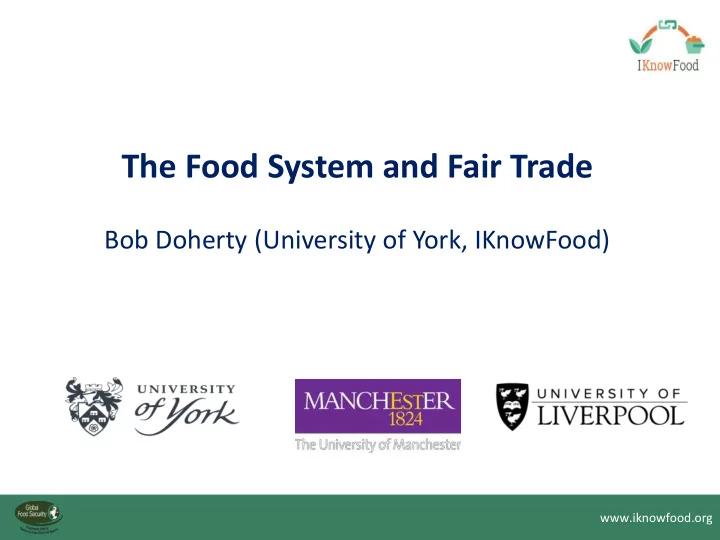

The Food System and Fair Trade Bob Doherty (University of York, IKnowFood) www.iknowfood.org
The Challenge • UN FAO estimates 60% more food will be demanded by 2050 • Over the next 35 years will have to produce more food than we have to date in history • By 2050 current agricultural practices will require 120% more water, 42% more land and will alone result in 2 degrees rise in global temperature • Increasing magnitude of threats and shocks which are human made • Growing academic consensus that industrial agriculture is creating a more vulnerable food system www.iknowfood.org
www.iknowfood.org
Concentration of Production www.iknowfood.org
Virtual Water content of food Water required to litres/kg Location produce 1kg Tomatoes 1 74 Spain Potato 2 95 UK Sugar (cane) 3 107 Swaziland Strawberries 4 110 Spain Sugar (beet) 5 429 Europe Milk 6 600 Ireland Cereals 7 1 622 Global average Meat (poultry) 8 6 000 Global average Meat (bovine) 9 17 700 UK 1. Chapagain & Orr (2009), 2. . Hess et al. (2011), 3. Cid Quintas (2010), 4. Montesinos et al, (2011), 5. Coca Cola Co. & Nature Conservancy (2010), 6. Hess et al. (2012), 7. Mekonnen & Hoekstra (2010), 8. UN World Water Development Report, (2003), 9. Chatterton et al. (2010)
Climate Extremes Index
Components of the Food System (Ericksen, 2008) www.iknowfood.org
Food System Resilience “ Food system resilience is the ability of the system over time to learn, adapt and transform to cope at multiple levels with external and internal stresses and shocks in order to provide supplies of food that are economically, socially, environmentally and nutritionally sustainable”. (IKnowFood, 2017) www.iknowfood.org
Call lls for! • Increased agricultural diversity • Focus on Agroecology, intercropping etc. • Information sharing across the system • Risk sharing • More diverse forms of ownership • More innovative incentives for producers based on ecosystem services • More social finance • Application of low-cost technologies • Focus on young agriculturists • Climate Change adaptation www.iknowfood.org
Responses • New trade agreements based on SDGs • Changes in public procurement rules • Private standards and company sustainability programmes? • Increasing interest in diversified farming systems, resilience, food security etc. • Growing number of hybrid organisations • Third party independent certification e.g. Fair Trade www.iknowfood.org
Fairtrade worldwide
Fair Trade Discourse • Key informant (Kenya) comments that our marketing communications is different from fair trade in Europe; – “ our message is different, we are not about helping the poor, the message is more about supporting producers we say; ‘Show your love for Africa, Buy Fairtrade !’ • Likewise in SA an informant commented ; – " Our communications are different from Europe, we don’t do poor farmers here in our marketing as it does not work. “ Another states – We get tired of people generalising that Africa is full of famine, we simply love this continent it’s wonderful and has a natural beauty, wonderful people. Our coffee is the best coffee on the best continent! Rather than support us because it’s the right thing to do”.
Global South Developments • Fair Trade Certified™ Indonesian Handline Tuna Fishery Program
Fairtrade Sales by Country Spend per capita on FLO products 40 35 30 25 Euros 20 15 10 5 0 Ireland Norway Switzerland Sweden Netherlands France Germany Japan UK Finland Denmark Italy
Fair Trade Promoting Resilience • A study by the Centre for Evaluation at Saarland University in Germany found that smallholder farmers who benefited from Fairtrade enjoyed higher and more stable incomes than producers in the respective comparison groups • Study involving coffee farmers in Uganda showed that participation in Fairtrade increased household living standards by 30% (Chiputwa, Spielman and Qaim, 2014) • Compared certified and non-certified farmers in the Central Region of Uganda
Fair Trade Promoting Resilience
Fair Trade Promoting Resilience • Crop diversification schemes to combine cash and food crops improve food security • Shared Interest, Oikocredit provide social finance for innovative trade mechanisms for smallholder farmer groups • Crowd Funding
The Story of Divine Chocolate Ltd “ How a social enterprise built a farmer- owned Fair Trade chocolate brand”
2007 Highlight Divine Chocolate announced its first dividend. As co-owners Kuapa Kokoo benefited by sharing in the profits.
Fair Trade Promoting Resilience • Climate Change Academy in East Africa to work with NGOs, producers, Government and business to encourage innovative approaches to climate change adaptation. • CLAC (Latin American and Caribbean Network of Fair Trade Small Producers and Workers) set-up Young Farmer Schools
Ecosystem & Climate Change • 2011 Fairtrade certification strengthened its environmental criteria to include; integrated pest management, prevention of soil erosion, improvement of soil fertility, sustainable use of water sources, sustainable waste management • 2015 Fairtrade Climate Standard , as a way for smallholders and rural communities to gain access to the carbon market
Working in collaboration!
Recommend
More recommend